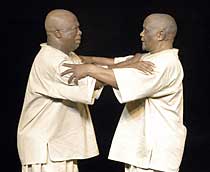In 1974, when "The Island" opened
at the Royal Court Theatre in London, South Africa was in the
grip of a repressive policy of apartheid. This season, as "The
Island" opens at the Brooklyn Academy of Music, the world
is in the throes of terrorism and war.
It seems that Athol Fugard’s play about responsibility, sacrifice,
freedom and oppression comes around just when we need it most.
"The Island" is a collaborative creation of Fugard,
a white, South African playwright, and two black, South African
actors, John Kani and Winston Ntshona. Although Fugard had written
many political plays prior to "The Island," this was
the first such collaboration in his nation’s history.
The play was first performed in South Africa in secret, for an
invited audience. After its London run, "The Island"
was performed on Broadway along with "Sizwe Banzi Is Dead,"
also by Fugard, Kani and Ntshona, where it earned Kani and Ntshona
a joint Tony Award for best actor.
In 1999, director Peter Brook worked with Kani and Ntshona on
restaging "The Island" at Brook’s Paris Theater, Les
Bouffes du Nord, and it is presented at BAM by the Royal National
Theatre and Johannesburg’s Market Theatre, where Kani is artistic
director.
"The Island" is a two-man, one-act play in which Kani
and Ntshona play prisoners John and Winston, who are planning
to stage Sophocles’ "The Trial of Antigone" for the
administrators and inmates of the Robben Island prison.
John is the director. He is eager and optimistic. He bullies
and cajoles the cynical, more passive Winston until he agrees
to don a makeshift wig and falsies to play the role of the brave
Antigone, who defies her dictatorial uncle, Creon, King of Thebes,
so she may perform her duty and bury her disgraced brother.
The parallels are obvious. Antigone’s burial of her brother,
and Winston and John’s performance of such a subversive play
are both acts of extreme courage in the face of a repressive
state.
"Remember there are responsibilities to others," John
tells his friend.
Despite its weighty theme, "The Island" can be painfully
funny. John and Winston somehow manage to laugh at each other
and their plight.
When John first sees Winston in his Antigone getup, he bursts
out laughing, then defends himself by explaining that he was
only laughing to "prepare [Winston] for stage fright."
But Fugard, Kani and Ntshona always bring the audience back to
the agonizing reality of the prisoners – when the prisoners imagine
talking to an old friend and asking him to tell their families
to write, when they remember old times and how they got to the
prison, and when John, who has been given an unexpected reprieve,
imagines how he will enjoy life outside prison.
"Time moves very slowly when you’ve got something to wait
for," he says.
"The Island" begins with a 15-minute mime of the two
prisoners working in the quarry – digging, filling wheelbarrows,
pulling and emptying the wheelbarrows, and then filling them
up again.
The scene is no doubt intended to convey the brutalizing, dehumanizing
labor of the prisoners, in order to make the audience feel it
so viscerally they will be pushed almost to the breaking point.
But this reviewer found the repetitive action more soporific
than searing. In fact, it took several minutes to wake up sufficiently
to pay attention to the rest of the performance.
But once this hurdle was overcome, Kani and Ntshona made magic.
Their personal energy, as well as their synergy, was marvelous.
Those of us who were not fortunate enough to see "The Island"
on Broadway 30 years ago can only imagine the effect of two young,
vigorous men playing the roles. But as aging men of 60, with
sagging chests and wrinkled faces, their courage is riveting
and their charm is magnetic.
Kani and Ntshona perform on an almost empty stage. A raised,
square platform represents the island. A few blankets become
their beds and then stage curtains. They wear khaki shirts and
shorts.
This minimal staging adds enormously to the production by focusing
attention on the two men and their relationship. There are no
distractions – either for the actors or the audience – and no
release from prison or from pain.
"The Island," like all good theater, takes a specific
situation and makes it universal. At a time when Americans are
still reeling from Sept 11, 2001, and when the fear of terrorism
has led to the passing of the Patriot Act and the creation of
a Department of Homeland Security, "The Island" asks
questions we need to be asking ourselves: How precious is our
freedom? How much freedom are we willing to sacrifice for security?
And how much are we willing to sacrifice for our freedom?
Kani and Ntshona, who have both spent time in the Robben Island
prison, certainly are men we need to hear – and to heed.
The Royal National Theatre and the Market Theatre’s production
of "The Island" continues April 8-11 at 7:30 pm, April
12 at 2 pm and 7:30 pm, and April 13 at 3 pm at the BAM Harvey
Theater, 651 Fulton St. at Ashland Place in Fort Greene. Tickets
are $25, $40 and $55. For tickets, call (718) 636-4100 or visit
www.bam.org.
























